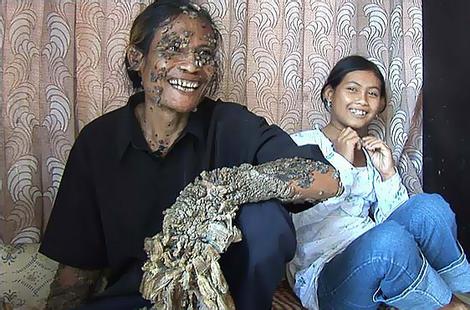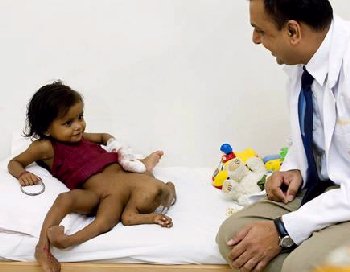| Health News of 2007
The Health eZine - News
1. Getting the lead outFirst, dogs and cats started dying - the culprit was melamine that found its way from animal feed in China to pet food in North America. Then, American and Canadian consumers were told to avoid Chinese-made toothpaste after thousands of recalled tubes in Nicaragua, Costa Rica, Panama and the Dominican Republic were found to contain diethylene glycol, an ingredient in anti-freeze. When millions of toys - all made in China - were recalled in the United States and around the world over concerns about lead levels, things really got serious. Under political pressure from the United States, China cracked down on product safety, shutting factories and beefing up regulations. Oh, and it also executed - yes, executed the former drug safety chief. With the 2008 Olympics in Beijing approaching, the country not only needs to keep safety problems from reaching North America, but must also contain them at home, because product safety was an issue in China long before it reached us.
2. Local EatingSticking close to home "Locavore" was named Oxford's word of the year, but that doesn't mean there's consensus on the definition. Is it eating food grown within 100 miles of your home, as two British Columbians committed to doing? Is it eating within your state or province? Your country? What if it's local but not organic? And are the environmental benefits over conventional diets really that remarkable? Some people say maybe not, and argue that excluding far-flung foods may hurt struggling farmers in poor countries. Locavores say the environmental results are there, and point out the other benefits of a diet that sticks close to home: local foods support local farmers and artisans, and because they're fresher, they taste better.
3. Cloned meat: Got clones?The possibility of cloned meat sold on a mass scale has come up before, but in 2007, it started to seem more likely. The FDA debated what the regulations would be around the labelling of meat coming from cloned animals - if there would be any at all. A decision on the sale of cloned foods was expected by the end of the year. Meanwhile, Governor Arnold Schwarzenegger vetoed a California bill that would have required labelling for meat from cloned animals. And a Wired magazine investigation pointed out that while governments and regulatory bodies battle it out, consumers might already be eating meat from animals descended from clones.
4. Gene sequencing: Your personal map, for a priceIn September, Craig Venter showed the world his genetic sequence, revealing many things about him: he's pre-disposed to waxy ears; he carries genes for heart disease and Alzheimer's, but also longevity; he may be more likely than others to be a smoker, thanks to seven genes linked to tobacco addiction. There's also a lot his genome doesn't tell us, because we don't know yet what those genes do and how they do it - and that's what worries some people about companies like 23andMe (and deCODEme, which will decode your genetic make-up for about $1000. As scientists learn more about how our genes work, these services will give people more information about their health. The concern, then, is how will people react to the information and are they paying for something that ultimately may be meaningless to them.
5. Food scares: Salad with a side of E. coliMost people wouldn't think twice about eating spinach - organic spinach, no less. They might even go out of their way for it. It's a vegetable, after all, high in folate and iron. But it also killed three people in the United States in late 2006 and infected nearly 200 others. The culprit was E. coli, a bacteria usually associated with meat that may have found its way into bagged spinach via cow manure through the irrigation system. The contamination and subsequent recall set in motion an examination of safety standards in the produce industry. But if several meat recalls this year didn't remind people that the food supply might not be safe, a report on the Food and Drug Administration released by an advisory panel containing scientists and industry representatives that pointed to a funding situation that puts American lives "at risk" certainly did.
6. Functional foods: Healthy businessIf you think that all foods are functional, you haven't spent much time in a grocery store's drinks aisle lately. The options have widened considerably beyond orange juice, apple juice, soda and bottled water. Now, if a beverage doesn't offer some sort of additional health benefit, it's passe. Exotic fruits like acai, mangosteen and goji berries are showing up in juice drinks, boasting impressive amounts of antioxidants and vitamins. Glaceau's vitaminwater earned itself some cache with a purchase by Coca-Cola and celebrity endorsements from Jennifer Aniston and 50 Cent, even if critics charged the health claims weren't supported. And speaking of Coke, they introduced Enviga, a green tea-spiked beverage the company says helps burn calories. It also set up a facility in China to research traditional medicines, with the hopes of applying that knowledge to future product offerings. Functional foods have really made a splash in the beverages category, but they're trickling out into other parts of the grocery store as well - witness the sudden ubiquitiousness of probiotics in everything from yogurt to breakfast cereal.
7. Vegansexuality: Meat-eaters need not applyIt was also a year in which our eating habits spilled into other areas of our lives, including our relationships. Enter vegansexuals: vegans who won't date carnivores. There was some debate about whether the trend was real or mostly existed online and in newspapers. Either way, vegansexuality's brief time as a hit with bloggers points to how much we're paying attention not just to what we're eating - and what everyone else is eating - but also what that says other aspects of our lives.
8. Eight-Limbed Girl Has Four Limbs RemovedTwo-year-old Lakshmi was born joined at the pelvis to a "parasitic twin" that stopped developing in her mother's womb. She absorbed the limbs, kidneys and other body parts of the undeveloped twin and was born with eight limbs. On Nov. 7, more than 30 surgeons operated for 24 hours on the child, removing her extra appendages. She left a hospital in Bangalore, India in mid-December and is doing well, according to doctors.
9. Woman Almost Dies Following Bikini WaxThe Brazilian bikini wax may be popular with women all over the world, but an Australian woman nearly lost her life undergoing the hair-removing procedure. A 20-year-old Melbourne, Australia woman with uncontrolled type 1 diabetes made the news last July after her brush with death was detailed in the June issue of the journal of Clinical Infectious Diseases. "Our case is notable, because it illustrates the infectious risks of pubic hair removal in a patient with diabetes," wrote the article’s authors. "The beauty industry is growing at an unprecedented rate and more invasive and potentially harmful procedures are increasingly available."
10. One-Year-Old Has Two Dead Triplets Removed From AbdomenIn December, a 1-year-old girl's deceased siblings were removed from her abdomen by Indonesian doctors at a Sumatra island hospital. The two bodies, believed to be triplets that did not fully develop, were successfully removed from the girl during a five-hour surgery. Doctors initially diagnosed the girl with stomach tumors.
11. Girl Has 10-Pound Hairball Removed From StomachSurgeons in Chicago removed a 10-pound hairball from the stomach of an 18-year-old girl suffering from a psychological condition in which she ate her own hair, according to a report in the Thanksgiving edition of the New England Journal of Medicine. The hairball measured 15 inches by 7 inches by 7 inches when it was removed. The patient was later discharged from the hospital and given psychiatric help.
|




|

12. ‘Tree Man’ Sprouts RootsDede, a 35-year-old fisherman from a rural Indonesian town, is living with a rare and peculiar medical condition that has transformed his life and his body. Tree-like warty “roots” cover his skin, and grow outward from his arms and feet. The condition developed after Dede cut his knee as a teenager. An American doctor attributes the infection to the human papilloma virus and an immune system deficiency, and believes the condition can be cured with regular vitamin A treatments.
13. Jawless Boy Undergoes First of Many SurgeriesA 17-year-old from Ireland, who has a rare disease that left him without a jaw or chin, underwent the first of many surgeries in June at The Mount Sinai Medical Center in New York with the hope of someday having a "normal" face to show the world. Alan Doherty has an almost unheard-of condition called otofacial syndrome, which has rendered him unable to eat or speak. He had his second surgery in November. The operations will continue into 2008.
14. Man With Almost No Brain Lives Functional LifeFrench doctors were amazed in July to find that a 44-year-old civil servant with an abnormally small brain has led a normal life with a slightly lower than normal IQ. The condition is called Dandy Walker complex and is a genetically sporadic disorder that occurs in one out of every 25,000 live births, mostly in females.
15. Parasitic Worm Ravages Woman’s Body Following Two-Week BenderAlcohol brings out the worst in some people. For one woman in the Netherlands, years of alcohol misuse topped off with a few weeks of binge drinking brought out a parasitic worm, which had been inside her for more than a quarter-century, according to a report in the June issue of the Lancet. Doctors believed the woman contracted the parasite in Suriname, South America (where she was born) more than 27 years earlier. It was only after chronic alcohol misuse and malnutrition that the infestation manifested, causing havoc in her digestive tract, including uncontrollable vomiting, diarrhea, and fever.
16. Oscar the CatA Furry Grim Reaper: Oscar, the resident cat at a Providence, R.I. nursing home, seems to have an uncanny knack for predicting when nursing home patients are going to die, by curling up next to them during their final hours. His accuracy, observed in 25 cases, has led the staff to call family members once he has chosen someone. It usually means they have less than four hours to live.
17. Sixty-Year-Old N.J. Woman Gives Birth to TwinsFoxnews.com was the first to break the story of Frieda Birnbaum, a 60-year-old from New Jersey who gave birth to twin boys in May, becoming the oldest woman to give birth to twins in the United States. The babies were delivered at Hackensack University Medical Center in Hackensack, N.J., by caesarean section. "Baby A" weighed 4 pounds, 11.4 ounces, and "Baby B" weighed 4 pounds, 11 ounces.
18. Record Hangover in the History of Drinking?When a 37-year old man walked into a hospital emergency room in Glasgow, Scotland complaining of "wavy" vision and a non-stop headache that had lasted four weeks, doctors were at first stumped, The Lancet reported in October. After finding out that the man had consumed 60 pints — roughly 35 liters — of beer over a four day period, following a domestic crisis, doctors concluded the man was suffering from the mother of all hangovers.
19. Man Oozes Green Blood Before OperationDoctors about to operate on man suffering from compartment syndrome were having trouble inserting a line, but what happened next seemed like science fiction. The man began oozing dark green blood out of the catheter, not unlike Mr. Spock might have done if he had been on the operating table. The man, who was taking a number of medications, is believed to have developed sulfhemoglobinaemia, a condition that forms when a sulphur atom is incorporated into the hemoglobin molecule. The condition was attributed to the migraine medicine sumatriptan.
20. Viagra ingredient in Chinese supplementsDietary supplements marketed to provide male sexual enhancement contain undeclared erectile dysfunction drugs started putting users at risk in 2007, the Food and Drug Administration warned. The agency is advising consumers to stay away from Shangai Chaojimengnan supplements sold under the names Super Shangai, Strong Testis, Shangai Ultra, Shangai Ultra X, Lady Shangai and Shangai Regular. The Chinese-made supplements are packaged and distributed by Shangai Distributor Inc. of Puerto Rico. Product testing indicates that some of these so-called supplements contain Viagra's active ingredient, sildenafil, or a compound with a chemical structure that mimics sildenafil. These chemicals could interact with nitrates in drugs taken for disorders commonly associated with erectile dysfunction, including diabetes, high blood pressure, high cholesterol and heart disease. The result could dangerously lower a user's blood pressure, according to the FDA. The agency also warned that the safety and purity of these illegal ingredients is unknown.
| |






